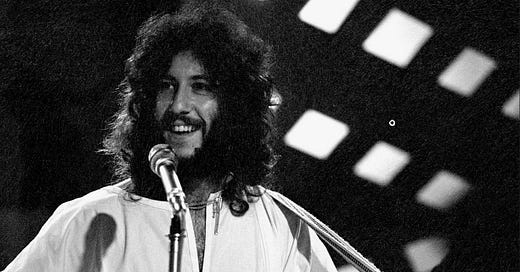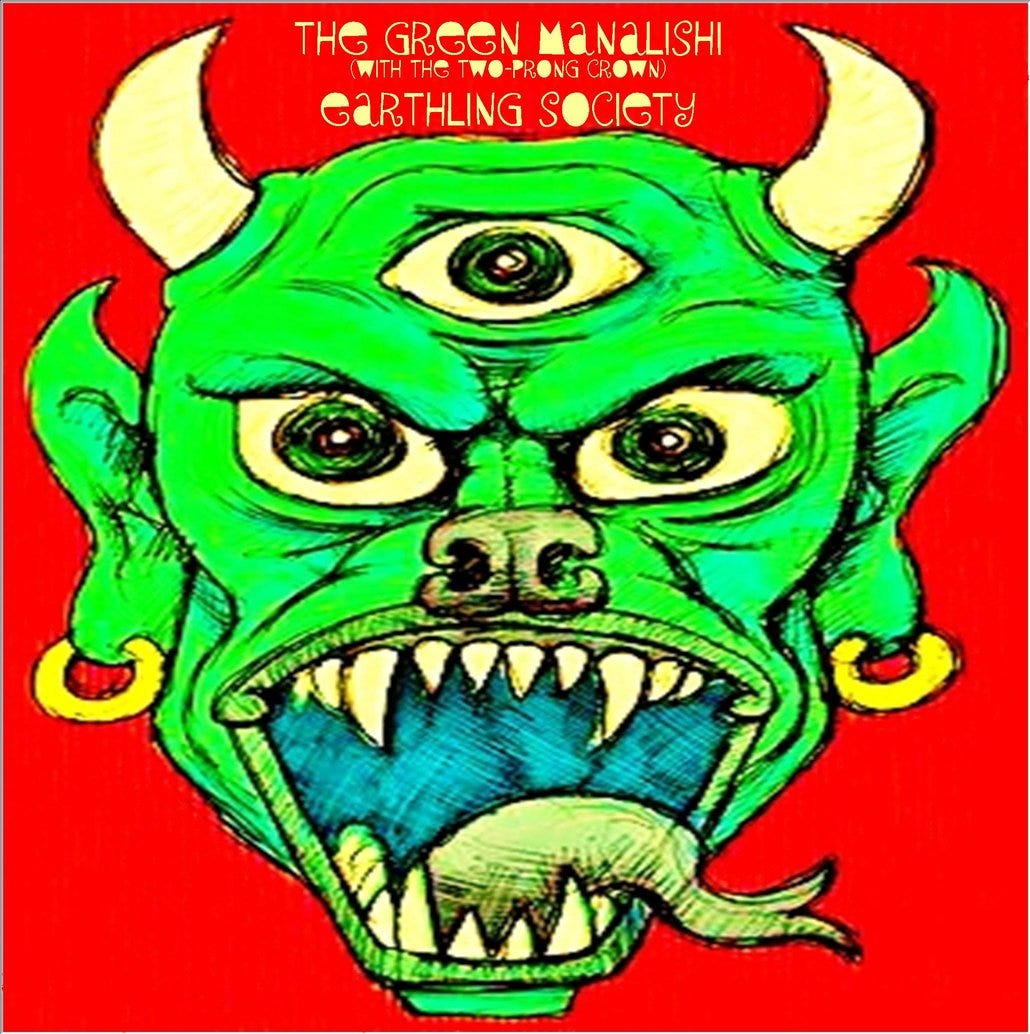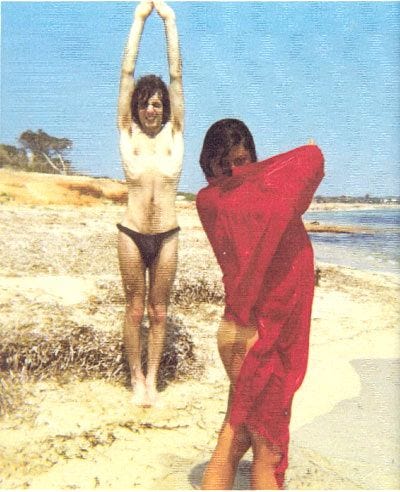The Madness and Enchantment of Peter Green, Bavaria and Beyond
The heavily mythologized Munich Incident was said to have broken Peter, we'll discuss why this isn't truly the case
If one were to investigate Peter Green's descent they would likely come across a BBC clip from 2014, were the relevant members of Fleetwood Mac discussing the “Munich Incident” of 1970. This incident, famous in certain circles of Rock and Roll lore enthusiasts, reads roughly the following. In march of 1970, during their first world tour, a pre-Stevie and Lindsey Fleetwood Mac landed in Bavaria, and were greeted at the airport by a beautiful woman in black velvet and a man with circle wire glasses, Rainer Langham, and Uschi Obermaier, styling themselves as the John and Yoko of germany. These enigmatic figures invited Fleetwood Mac to a party after their gig later in the evening. The party was held at Kronwinkl Castle, located about 45 minutes outside of Munich, sporting 26 rooms and two kitchens, rented by the Highfish Commune. It was their place to have LSD trips, record music, and film “revolutionary pornography”. During this fateful night Peter and road manager Dennis Keaton (and maybe Danny Kirwan, accounts vary) were “whisked away” to this mysterious castle, and given copious amounts of LSD (and by some accounts drugged, either with more LSD, or god knows what else). By the time Mick Fleetwood, Jeremy Spencer, John Mcvie, and Dinky Davis arrived to collect their errand band member(s) theyare hopelessly high. Dennis, bewildered by the whole experience and sobering up wanted to leave, and Peter was recording a now lost tape, to the other members of Fleetwood Mac sounded like ear grating noise emanating from the basement, but to Peter he would recall this as some of the best music he’d ever play. After they wrangle Peter into the car to head back to the hotel, Jeremy Spencer recalls how it was like the two imbibers were almost gripped by something, and alludes later to some “Hocus Pocus” happenings that same night. The members of Fleetwood Mac believed that this German Nazi Cult was targeting pop stars to extract resources, wealth, influence, and soul from unwitting victims.
This story is half complete at best, and according to some, is part of a coverup, a carefully constructed fabrication to lube the gears of the pop music machine. The popular version is the recounting of Fleetwood Mac members, and in the BBC documentary “Peter Green Man of the World” (in typical BBC fashion) they do not even mention that there is another side of this, namely Peter and the Germans. Even to his death, Peter describes this night as one of the best in his life. What was played that night Peter considered to be “the most spiritual music he had ever played”, so I believe (I have no evidence of this) that Peter considered this tape too special and personally significant to be shared with the public, and certainly to the unappreciative other members of Fleetwood Mac. According to Peter’s estranged son Liam, this lost tape is with his first wife Jane.
Is it possible the Munich incident inspired Peter to be disenchanted with making commercial music, and British Culture as a whole? Before the incident Peter was growing discontent with the direction of Fleetwood Mac, creatively, personally, and commercially. Peter was becoming haunted by fame and money, experiencing ravaging nightmares as the “Green Manalishi”, a dog from the afterlife. He said of the song’s inspiration:
"It scared me because I knew the dog had been dead a long time. It was a stray and I was looking after it. But I was dead and had to fight to get back into my body, which I eventually did. When I woke up, the room was really black and I found myself writing the song.".
Harkening to Peter’s blues foundations, the lore shares similarities to Robert Johnson’s “Hellhound On My Trail”. Whether or not Johnson or Green was aware of it, in esoteric lore dogs have long been associated with magic, witchcraft, crossroads, the moon, and ghosts, most notably in ancient Greece's Hekate, and Voodoo’s Papa Legba. According to lore, both figures are known to endow inspiration (and/or madness) to petitioners at the crossroads. The lyrics of The Green Manalishi are quite telling to this effect,
“Now, when the day goes to sleep
And the full moon looks
The night is so black that the darkness cooks
Don't you come creepin' around
Makin' me do things I don't wanna do
Can't believe that you need my love so bad
Come sneakin' around tryin' to drive me mad
Bustin' in on my dreams
Makin' me see things I don't wanna see
'Cause you're da Green Manalishi
With the two prong crown
All my tryin' is up all your bringin' is down
Just takin' my love then slippin' away
Leavin' me here just tryin' to keep from followin' you “
To me, it seems likely that most of Green’s nighttime visions were kept to himself, and that this song and his recounting, were only what he thought would have been palatable to those around him. He obviously was quite compelled by these scenes, during the recording of Green Manalishi he demanded take after take, keeping the band up all night to get the track just right.
What the hell is a “Manalishi”? To this day, no one single definition can be identified. Various interpretations are available, from a Japanese demon mask, a celtic word for phallus, or a special type of LSD. To me, all of these seem unlikely, in my estimation it is most likely when Peter awoke from his nightmare of the ghostly dog, the word and image of “Manalishi” was etched into his mind, a twisted lapidary, It was green, a double entendre, for both his name, and that which haunted him shared this likeness.
The earliest recording of “The Green Manalishi” available is a live version from February 1970, a month before Munich, so we can safely say that Green’s woes about money and fame did in fact begin before the night with the Highfish crowd.
Considering Peter’s nighttime visions described above, it’s no wonder how Peter was enchanted by the “kommunal” ways of Rainer, Uschi, and Highfish, who after being involved with groups known for political activism, arson, bombings, and the ”Pudding Assassination”, separated, and formed the Highfish commune, focusing on creating media and sought to cultivate an “inner revolution”. The members of Highfish took vows to live communally, took oaths of polyamory, removed the doors to the bathrooms, and had to share all phone calls on speakerphone, among other tenants according to Leninist values. In my mind it’s easy to see how this kind of living would inspire someone like Peter, who, no doubt shared antagonism towards the fragmented and atomized social life of suburban post-war Britain.
I’m reminded of Pink Floyd’s The Wall where individuals are seen as cogs in a machine, and are told to sit down, shut up, and do their job. As an aside, rumors circulate about Uschi Obermaier and Syd Barrett, Peter and Syd both being known as famous “Acid Casualties” there is no evidence that Syd and Uschi ever dated, and seemingly only met on a beach randomly. Admittedly though, the idea of a mysterious woman enchanting rockstars who would later go mad, or die, certainly is an alluring hook, however to state such would be an affront to historical facts.
The Munich night was known as Peter’s “breaking point”, but this is inaccurate. It seems more appropriate to consider the Munich night to be when Peter finally saw a light at the end of the tunnel, a way to escape the Manalishi, a way to live in alignment with how he felt, and was only able to dimly share with others, a group of people who finally understood how he felt. To others, I can see how this could be called a “breaking point” but all facts point to Peter’s decline to be a sloping descent, not a singular madness which can be easily attributed to two German hippies in a castle and an orgiastic possession. Certainly though, the tabloids, both modern and of the time, would prefer this easier to digest narrative. Only years later would anyone point to this evening as a turning point for Peter, especially the other members of Fleetwood Mac, for whom resentment of that night, and of the Germans, would build, calling them a cult, among other things. According to Rainer, and his unofficial publicist, there was a Rolling Stone article from the 70’s that even went as far as to call them a “Nazi Cult”. A lost article from Melody Maker around June 1970 mentioned by a very helpful Facebook commenter, would cite Mick as claiming Peter’s mental health was fine, and that the band all moved into one house in England, with their families, something which Peter had suggested, and been ridiculed for. In this same article, Mick seems to have learned from Peter’s departure, with regret saying “"if we had done what we are doing now when Peter was with us, Peter would never have left". It has been hard to untangle this web, and there seem to be big differences between how Fleetwood Mac viewed these events at the time, and how they viewed them years later.
To the Germans, it really was just another weekend, tripping with rock stars in a castle, they got along with Peter well, even seeing him two weeks after in London and meeting Mick Jager in the hopes of organizing a Bavarian Woodstock. It was only years later they learned of Fleetwood Mac’s antagonism towards them, the slander, and apparent scandal, they were blindsided by these accusations, having been libeled by Rolling Stone.
However shortly after it was clear Peter was on a downward spiral. Even before Munich he took up wearing robes and a crucifix, started giving away his guitars and money, insisted that the profits from the band should be donated, and was heard saying strange things. After leaving Fleetwood Mac in 1970, and briefly returning, Peter would not been seen for a while, and in 1977 famously smuggled a shotgun from Canada, which he pointed at his manager, Clifford Davis, angry about the royalty checks. He was arrested, and after committed to a psych ward where he was diagnosed with schizophrenia and treated with anti-psychotics, sedatives, and electroconvulsive shock therapy. After he was released, he would record a number of albums, including the honorary Krautrock “End of the Game”.
Psychologists and psychiatrists have long struggled to identify higher states of consciousness, and this is a contentious debate in the field, where mysticism ends, and psychosis begins. The late 70s was the height of behaviorist thinking, and no doubt Peter’s mental state was not given a second look in this regard, and would be heavily treated. After all, whatever nuances may be present, his mental state led him to smuggle a gun over the Atlantic ocean, and point it at a man for giving him money. Oftentimes the line between mysticism and psychosis is heavily blurred, Joseph Campbell said “The psychotic drowns in the same waters in which the mystic swims with delight.”. An article from the IHMU provides some clarity into this dynamic https://imhu.org/spiritual-emergency/mysticism-and-psychosis/
It seems that for some time, Peter was teetering the line, becoming more paranoid about the Green Manalishi, anxious about his material attachments, and increasingly delusional, sometimes swimming with delight, other times, drowning in those waters.
Unanswered Questions:
-Where was Danny that night?
-What was the “Hocus Pocus” alluded too? (Rainer explicitly denies anything of the sort)
-Why the difference in Fleetwood Mac’s attitude directly after the Munich night vs years later?
Thank you to Tim Douglas on Facebook for helping provide information and corrections.
Sources and additional reading:
https://freewheelinobscurity.blogspot.com/2021/03/the-fall-of-peter-green-munich-21-march.html
https://omnibuspress.com/blogs/blog/mythic-munich-additional-perspectives
http://ledge.fleetwoodmac.net/showthread.php?t=27555&page=2
https://faroutmagazine.co.uk/fleetwood-mac-lost-peter-green-and-danny-kirwan-to-acid/
Martin Clemens- Peter Green: Founder of Fleetwood Mac - Revised and Updated 2022






